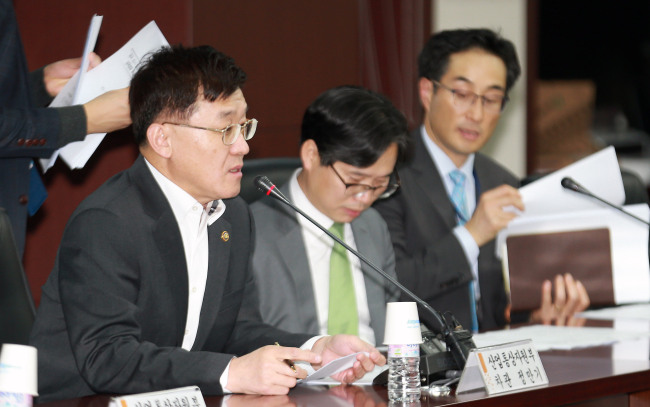What Trump's victory means for Korean businesses
Korean exporters fear Trump’s pledges to revive trade barriers, but seek new opportunities
By Korea HeraldPublished : Nov. 9, 2016 - 20:24
A dramatic victory by US President-elect Donald J. Trump, a strong advocate of trade protectionism, on Wednesday sent shockwaves through Korean industries which heavily rely on exports to the world’s largest economy.
Major exporters of automobiles, tech devices, steel and petrochemical products expressed concerns over the prospect of US-Korea trade under Trump’s presidency, of which many fear will push to have new sets of tariff barriers revived and free trade agreements rewritten.
During his campaign the billionaire, famous for his straightforward but controversial remarks, slammed the 4-year-old trade pact between South Korea and the US, calling it a “job killing deal” and vowed to renegotiate with the Korean government, if elected.
The Korea International Trade Association representing 70,000 Korean exporters warned that Trump’s victory into the White House will affect South Korea “relatively more” than the US’ other trading partners, stressing the nation’s heavy trade dependency on the US market.
Major exporters of automobiles, tech devices, steel and petrochemical products expressed concerns over the prospect of US-Korea trade under Trump’s presidency, of which many fear will push to have new sets of tariff barriers revived and free trade agreements rewritten.
During his campaign the billionaire, famous for his straightforward but controversial remarks, slammed the 4-year-old trade pact between South Korea and the US, calling it a “job killing deal” and vowed to renegotiate with the Korean government, if elected.
The Korea International Trade Association representing 70,000 Korean exporters warned that Trump’s victory into the White House will affect South Korea “relatively more” than the US’ other trading partners, stressing the nation’s heavy trade dependency on the US market.

The US is South Korea’s second-largest national trading partner, after China. Of the total, shipments to the US account for 13.3 percent. Major shipments include smartphones and home appliances as well as cars.
“We cannot overrule the possibility of (Trump) actualizing his campaign policies such as renegotiating the US-Korea FTA and imposing sanctions on (of which he calls) currency manipulators,” said Je Hyun-jung, a senior researcher at KITA.
“The (Korean) government should seek various types of scenarios to minimize the impact of Trump’s win on Korean economy.”
In contrast to the grim prospects, the state-run trade promotion agency Kotra said the formation of the new US administration by a New York real estate developer will offer new opportunities to Korean exporters, particularly on construction, carbon-emitting energy, and medical sectors.
“Trump has been stressing the need to open (the US market) to foreign drug exporters to increase systematic efficiency of US public healthcare. This is a favorable factor for local drugmakers,” said KITA in a statement.
Citing Trump’s campaign pledge of $1 trillion investment in public infrastructure, the market demand for construction, communication infrastructure and transportation will grow, the agency added.
Trump’s opposition toward renewable energy, however, could also impose burdens on Korean businesses that have been betting on solar panels for their future growth.
Korean tech and auto companies, whose biggest importer has been the US consumers, are expected to be affected the most.
The nation’s largest smartphone and appliances maker Samsung Electronics‘ sales in the US market last year was around 68.9 trillion won ($59.9 billion), accounting for 34 percent of its total sales. The sales figure is bigger than 38.6 trillion won in Europe and 31 trillion won in China. Its local rival LG Electronics’ sales in the US also stood at 16 trillion won last year, accounting for around 30 percent of its total global sales.
“Korean tech firms, which are selling premium products in the US, may have less damages in terms of cost changes from interest rates or exchange fluctuations,” an official from Korea’s major tech firm said on condition of anonymity.
“However, Trump’s pledges on job creation and protectionism may lead to a tax increase for the companies which have no factory in the US,” he added.
South Korean tech giants, Samsung and LG, have no smartphone or appliance factories on US soil. Hyundai Motor Group, the nation’s largest carmaker, has two -- one in Alabama and in Georgia.
Concerns are growing over the Korean auto industry, which has been viewed as the biggest beneficiary from the free trade agreement with the US.
If the president-elect pushes the revision of the FTA, the Korean auto companies, mainly Hyundai Motor and Kia Motors, may face massive job losses, experts said.
Hyundai said it would “closely watch how the US election affects the business environment and take action accordingly.”
Trump’s win, however, could be beneficial for some Korean companies, according to industry sources.
Korea Aerospace Industries, the nation’s sole aircraft manufacturer, in a joint venture with the American defense giant Lockheed Martin has been setting its sights on the US Air Force’s $10 billion program called T-X. The winner is expected to be announced in the second half of 2017.
“We have no official statement. But as of matter of fact, Trump won in Texas, home to Lockheed Martin,” said a KAI official.
Despite the surprising election results, other businesses took a wait-and-see stance, saying that what really matters for the Korean economy is the deteriorating global economy itself, not who is the winner of the White House.
“With American steelmakers adding pressure on the US government to tighten regulations on steel imports, we have already been expecting to see policy directions leaning onto trade protectionism,” an industry insider said on condition of anonymity.
“Major steelmakers like Posco and Hyundai Steel should keep monitoring (policies) from the US and other major importers on possible trade risks,” he added.
By Cho Chung-un and Shin Ji-hye
(christory@heraldcorp.com) (shinjh@heraldcorp.com)
-
Articles by Korea Herald



![[Herald Interview] 'Amid aging population, Korea to invite more young professionals from overseas'](http://res.heraldm.com/phpwas/restmb_idxmake.php?idx=644&simg=/content/image/2024/04/24/20240424050844_0.jpg&u=20240424200058)















